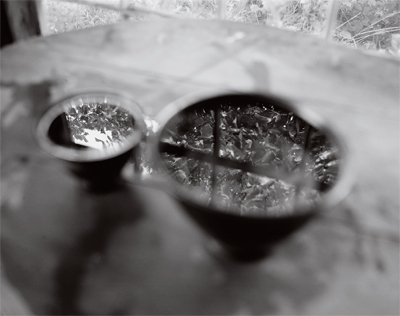
WHEN WE SIT down to eat in our monastery, we try to be conscious of several things. We eat in silence because this way you can concentrate on the food and practice awareness. Then we eat everything on the plate. This is our way of honoring the conservation of resources. We also try to make sure that the conservation of resources takes place before the food even reaches our plate: the portions we receive aren’t too large, and this way it isn’t difficult to eat all that’s been given to us. We also remember the preparation of the food—the work of the cooks and the cleaners and those who picked the vegetables and processed the food. We don’t choose what we eat at the monastery. We’re not in the monastery to become gourmets. We’re there because we need to cultivate appreciation and nonattachment to all things, including food.
These ritual behaviors are part of what we call the “five contemplations.” The first contemplation is to develop gratitude. We give thanks for the food and how it came to us. We reflect on the food’s growth from seed to flowering plant, its harvesting and journey from the fields to the market; then we appreciate its arrival and preparation in the kitchen, and the effort it took to supply this food. We acknowledge the interdependence of all natural things—how they work together in harmony to bring us what is nutritious and life-giving. We recognize, too, that life forms may have been harmed in the gathering of this food (even though we don’t eat meat, we know that animals may have been disturbed by the harvesting of the vegetables, fruits, and grains).
The second contemplation is to develop humility. In the monastery we’re privileged in that we don’t pay money for our meals. However, we know the meal is not cost-free. We’re also aware that many in the world don’t have access to any food, no matter what the price. It’s a great blessing to us that we have people who cook for us and prepare the tables. We’re always at risk of taking them for granted—just as, in society as a whole, we take for granted the people who work in the factories or the migrant laborers who pluck our fruits and vegetables from the trees and bushes or pull them up from the ground. That we forget all those who work out of sight for our comfort is an unfortunate tendency in our culture. The second contemplation forces us, therefore, at least for a moment, to be aware that they exist and that we should be grateful for them. Perhaps such gratitude will make us more likely to help these laborers as they advocate for better work and living conditions.
I remember on one occasion, I was eating with a young man who asked: “If I paid five dollars for this meal, why do I still have to say ‘thank you’?”
“Do you think that your five dollars really bought this meal?” I asked him. “Let’s count up the economic cost that led to this food coming together in this form for you. Think about all the causes and conditions that were involved in terms of time and space for this set of ingredients to be cooked in such a way and then be available to eat.” And so the young man and I did just that. I can’t remember the exact number we came up with, but the amount of money and the perhaps unquantifiable effort involved were considerably more than what he had paid. The young man ate a bit of humble pie with his meal that day!
The third contemplation we perform is to develop restraint. Restraint means protecting the integrity of our mind so that we’re less likely to depart from our discipline; this way we avoid errors such as greed. So, not only should we not take more than we need but also always practice consideration in making sure that everyone has what they need. We must be aware not to become selfish, indulge our tastes, and wish to take more than our share—whether it’s piling our plate high or making it so that other people don’t get enough to eat. We shouldn’t ask why we were given the food, complain about the taste, or disparage the skills of those who prepared it. We should accept it with gratitude and grace, thanking everyone involved for their work and care.
The fourth contemplation is the generation of health-providing thoughts about the food. We should sense it nourishing us and giving us energy and vitality, coursing through our bodies. That’s why the food in the monastery should always be nutritious. The food prepared should be good for the digestion, soft on the palate, and flavorful. There’s no reason that it should be devoid of taste or pleasure. The Chinese monastic tradition considers food and medicine to be from the same source. Food is always cooked using herbs and spices together to combine taste, nutritional value, and the healing power of those herbs and spices. This is a different conception of food from that in the West, where nutrition has, until relatively recently, not been thought of as a key component in preventing disease and curing ailments. The fourth contemplation allows us to consider food as a medicinal force.
The fifth contemplation aims to encourage examination of the purpose of our lives. The entire process of sitting down to eat, reflecting on food and its preparation, and then the eating of it should be a method—one among many—to take us further on the path to enlightenment. This again is why the food in our temples is vegetarian: because we want to emphasize the life-giving nature of food and to discourage the taking of life.
♦
From Authenticity: Clearing the Junk: A Buddhist Perspective, © 2007 by Venerable Yifa. Reprinted with the permission of Lantern Books, New York.
Thank you for subscribing to Tricycle! As a nonprofit, we depend on readers like you to keep Buddhist teachings and practices widely available.
